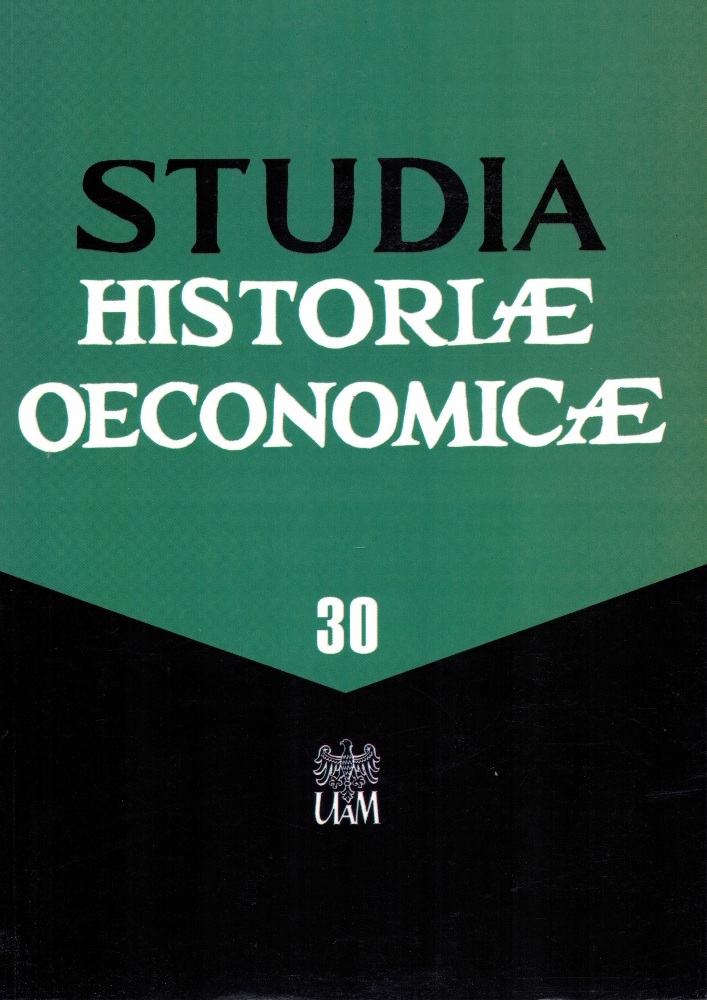Abstract
Labour belonged to the most important values in the catalogue declared by the ideologists of communism. Paradoxically and contrary to the propaganda, the quality of labour was one of the major weaknesses of the communist system in Poland since its beginning and a source of its demise in the long run. A measure of its irrationality could be the fact that throughout its existence it was impossible to create a mechanism promoting good labour, whereas the remedies undertaken often did not improve the situation, but even made it deteriorate. In some periods they even reflected the totalitarian character of the state. The article presents the premises governing low labour productivity in nationalized workplaces during the first decade of the so called People’s Poland, as well as the activities undertaken by the regime to improve labour discipline during the Stalinist times. In this context, the article discusses the impact of the Act on Securing the Socialist Discipline of Labour passed in January 19, 1950. It was in fact a special act – its consequence was having more than 800 thousand cases referred to court, about 350 thousand people convicted, while more than 30 thousand sent to prison.
References
AAN, CUP – Archiwum Akt Nowych, Centralny Urząd Planowania w Warszawie, no. 2/192.
AAN, KC PZPR – Archiwum Akt Nowych, Komitet Centralny Polskiej Zjednoczonej Partii Robotniczej, no. 2/1354.
AAN – Archiwum Akt Nowych, Ministerstwo Sprawiedliwości w Warszawie, no. 2/285.
AAN – Archiwum Akt Nowych, Ministerstwo Pracy i Opieki Społecznej w Warszawie, no. 2/402.
AAN, PKPG – Archiwum Akt Nowych, Państwowa Komisja Planowania Gospodarczego w Warszawie, no. 2/274.
AIPN – Archiwum Instytutu Pamięci Narodowej w Warszawie, Ministerstwo Bezpieczeństwa Publicznego w Warszawie, sign. IPN BU 1572/1455.
‘Protokoły posiedzeń Rady Gospodarczej PPS (1945–1946)’ (1982) Z Pola Walki, 1–2, pp. 227–262.
Dz.U. 1956 No 41 item 187 – Dziennik Ustaw, Ustawa z dnia 10 września 1956 r. w sprawie uchylenia przepisów o zabezpieczeniu socjalistycznej dyscypliny pracy.
Dz.U. 1953 No 16 item 63 – Dziennik Ustaw, Dekret z dnia 4 marca 1953 r. o wzmożeniu walki z produkcją złej jakości.
Dz.U. 1950 No 20 item 168 – Dziennik Ustaw, Ustawa z dnia 19 kwietnia 1950 r. o zabezpieczeniu socjalistycznej dyscypliny pracy.
Dz.U. 1950 No 10 item 106 – Dziennik Ustaw, Ustawa z dnia 7 marca 1950 r. o planowym zatrudnieniu absolwentów średnich szkół zawodowych oraz szkół wyższych.
Dz.U. 1950 No 10 item 107 – Dziennik Ustaw, Ustawa z dnia 7 marca 1950 r. o zapobieżeniu płynności kadr pracowników w zawodach lub specjalnościach szczególnie ważnych dla gospodarki uspołecznionej.
Dz.U. 1937 No 31 item 242 – Dziennik Ustaw, Ustawa z dnia 14 kwietnia 1937 r. o układach zbiorowych.
M.P. 1950 No 51 item 584 – Monitor Polski, Uchwała Rady Ministrów z dnia 5 maja 1950 r. w przedmiocie określenia przypadków usprawiedliwiających nieobecność w pracy oraz warunkach i trybie usprawiedliwienia nieobecności.
Rocznik statystyczny 1955 (1956) Warszawa: GUS.
Rocznik statystyczny przemysłu 1945–1965 (1967) Warszawa: GUS.
Aleksandrow, N. (1949) Socjalistyczna dyscyplina pracy. Translated by Biernacki, J. Warszawa: Współpraca.
Applebaum, A. (2005) Gułag. Translated by Urbański, J. Warszawa: Świat Książki.
Chumiński, J. (1999) Ruch zawodowy w Polsce w warunkach kształtującego się systemu totalitarnego 1944–1956. Wrocław: Wydawnictwo Akademii Ekonomicznej im. Oskara Langego.
Chumiński, J. (2006) ‘Robotnicy wobec doświadczenia codziennego w zakładach przemysłowych (1945–1989)’, in Miernik, G. and Piątkowski, G. (eds) Życie codzienne w PRL (1956–1989). Radom, Starachowice: Radomskie Towarzystwo Naukowe, Niepubliczne Centrum Doskonalenia Nauczycieli Nowator, pp. 7–33.
Chumiński, J. (2009) ‘Systemowe uwarunkowania erozji etosu pracy w PRL (na przykładzie środowiska robotników przemysłowych 1945–1956)’, Prace Naukowe Uniwersytetu Ekonomicznego we Wrocławiu. Seria: Ekonomia, 74(3), pp. 251–253.
Chumiński, J. (2010) ‘Mentalne bariery rozwoju gospodarczego PRL (na przykładzie pracowników przemysłu)’, in Chumiński, J. (ed.) Modernizacja czy pozorna modernizacja – społeczno-gospodarczy bilans PRL 1944–1989. Wrocław: GAJT Wydawnictwo 1991, pp. 92–231.
Fiejka, Z. (1961) ‘Zmiany wydajności pracy i zatrudnienia w przemyśle w latach 1949–1959’, Studia Ekonomiczne, 6, pp. 31–84.
Gubiński, A. (1954) Socjalistyczna dyscyplina pracy w prawie karnym. Warszawa: Wydawnictwo Prawnicze.
Heller, M. (1989) Maszyna i śrubki. Jak hartował się człowiek sowiecki. Warszawa: Pomost.
Jankowski, S. (1989) Odbudowa i rozwój przemysłu polskiego w latach 1944–1949. Warszawa: Książka i Wiedza.
Jasińska, A. and Siemieńska, R. (1975) Wzory osobowe socjalizmu. Warszawa: Wiedza Powszechna.
Jezierski, A. and Leszczyńska, C. (1999) Historia gospodarcza Polski. Warszawa: Key Text.
Kulesza, J. (1950) ‘Ustawa o zabezpieczeniu socjalistycznej pracy’, Przegląd Związkowy, 5, p. 238.
Ogólnopolska Konferencja Przemysłowa (1945). Warszawa: Wydział Propagandy i Informacji Ministerstwa Przemysłu.
Ost, D. (2007) Klęska Solidarności. Gniew i polityka w postkomunistycznej Europie pracy. Warszawa: Muza.
Popławski, H. (1953) Podstawy prawne i istota socjalistycznej dyscypliny pracy. Warszawa: Wydawnictwo Związkowe CRZZ.
Sachnowski, Z. (1955) ‘W walce o umocnienie demokratyzmu’, Przegląd Związkowy, 4, p. 149.
Salwa, Z. (1961) Socjalistyczna dyscyplina pracy. Warszawa: PWN.
Swadźba, U. (2001) Śląski etos pracy. Studium socjologiczne. Katowice: Wydawnictwo Uniwersytetu Śląskiego.
Wilczewski, R. (1974) ‘Rozwój przemysłu w Polsce w latach 1947–1955’, in Kaliński, J. and Landau, Z. (eds) Gospodarka Polski Ludowej 1944–1955. Warszawa: Książka i Wiedza, pp. 240–318.
License
Copyright (c) 2012 Jędrzej Chumiński

This work is licensed under a Creative Commons Attribution-ShareAlike 4.0 International License.




